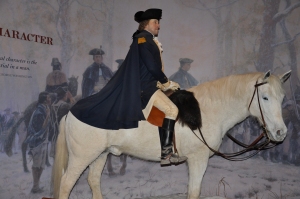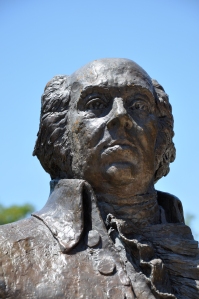
When giving tours or giving speeches, I try hard not to come off as an insufferable crank (despite being one.) This often requires a bit of dissemination on my part. Such as when a woman tells me, her voice dripping with pride, that her husband is a great history scholar – he has read all of Bill O’Reilly’s books. Given the world I live in, where both adults and children admit to me that they have no idea who wrote the Declaration of Independence, who we were fighting against in the Revolutionary War, and why did all of these battles take place on National Parks – I can only smile wanly and nod. “Have you read them?” is the next, unavoidable question. “Well, no, I spend more of my time reading history books by…you know, historians or writers.”
Given all of that, I can’t take umbrage when people tell me they love the David McCullough book, John Adams. How could I? It would be like complaining that you don’t regularly groom your animals in a slaughter house. But let me let those of you who are reading my blog in on a little secret – I think John Adams is the most overrated history book I have ever read, and I think McCullough is a fraud. (For those of you who reply, “I think he’s a great writer,” I can only offer the response that one can be both.)
Before discussing this book, and the mini-series it spawned, let me note something about many, many well-respected authors and historians that I find amazing. They act like children. Too many historical writers feel the need to be totally on one side or the other in their character-driven narratives. Thus, if they love Washington, they feel the need to hate Jefferson for his alleged apostasies against Washington. Hamiltonians must hate Jeffersonians every bit as much as Jeffersonians hate Hamiltonians. (Want to know something interesting? “Hamiltonians” comes through fine on my computer, but “Jeffersonians” has that tell-tale red line under it, indicating a misspell. When I check to see what might be more appropriate, it offers “Jeffersonian” without the s. What, am I the only one left!)
McCullough takes this tendency to extreme and ridiculous heights. His book, which is a one-volume biography of Adams, spends more time kvetching about Jefferson than is necessary or appropriate. Yes, I get it, I get it, he was mean to Adams, I know.
I hear this all the time about Jefferson. He was mean to Hamilton. He was mean to Washington. He was mean to Adams. I respond, dispassionately – being a calm and impartial Historical Expeditionary – that he was on several occasions somewhat two-faced in his dealings with these guys. This came from his twin tendencies – first, he did not like engaging in disagreeable personal invective but, second, he also did not want the country, this potential paradise on earth, to be turned into a pale imitation of England. In other words, this wasn’t a fight over a girl in junior high school – it was about saving humanity. It was about doing everything he could to save humanity by stopping the attempts of the Hamiltonians to to open the doors of the governing chambers to the speculators, and to bring about the festering, putrid land of corruption and moral decay that is the America of today.
Here, in a nutshell, is the biggest problem with the McCullough book. He took a nice advance (his time must always be paid for) to write a book about Adams and Jefferson. (Something that was just done by Gordon S. Wood. Perhaps I’ll blog about it one day.) But he didn’t like Jefferson. Adams, on the other hand, made him feel all warm and squishy. So, while most of the book is a long curricula-vitae on Adams’ accomplishments, another large portion is on how much Jefferson sucked. He spent too much money. He was a hypocrite. Blah, blah, blah. Meanwhile, Adams was a bastion of rationality and intellect.
Now, let me make something clear here – I friggin’ love John Adams. What historian – or, to be more accurate, Historical Expeditionary – wouldn’t? I fell in love with history when my mother took me to the musical 1776, and I now revel in his journals and letters. He is the one guy who really seems to let me know him through his written word, instead of letting me know the reputation he would like to leave behind.
That being said, he is a larger than life, sometimes out of his mind, individual, like Churchill or Teddy Roosevelt, somebody who goes off the deep-end as often as he avoids doing so. Benjamin Franklin’s oft-repeated quote could not be more accurate: “Always an honest man, often a wise one, but sometimes, and in some things, absolutely out of his senses.” Joseph Ellis, who was kind of a dick to me when I asked him to sign several of his books at a book signing, comes much closer to the essence of Adams in his wonderful book, Passionate Sage.
I love Adams. But that doesn’t mean I want you to skip a thorough discussion of one of the great blights of his career, the enactment of the Alien and Sedition Act, which basically made it illegal to criticize the dude in print. After grudgingly admitting that, yes, Adams did sign the Act (and blaming Abigail for telling him to do so), he is quick to tell us that it “must be seen in the context of the time, and the context was tumult and fear.” Ok. All the more reason not to engage in it, one might say.
What bugs me the most about the book is its universal acclaim and its totally preposterous Pulitzer Prize. Now that does bother me, because I am thinking of all the younger and hungrier writers who do not demand to be paid for each second of their time but who are killing themselves trying to write books that might further historical discourse and knowledge. I don’t mind when well-known authors win the award if they deserve it – Doris Kearns Goodwin’s Lincoln classic, Team of Rivals, comes immediately to mind – but am disgusted and dispirited when one wins it who does not.
Why do I call McCullough a fraud? First of all, he starts the book with the seemingly obligatory orgasmic celebration of a “new” collection of journals and letters, in this case the Adams Papers. All of which would be fine if he actually read them, but I don’t believe he did. I found just about every quote to be familiar, most of them pulled, no doubt from the excellent two-volume study on Adams written by Page Smith in 1962. I’ve always hoped that some graduate student would take down every quote in the McCullough book, and then match them up with the Page Smith book. I’d be surprised if there were ten quotes in McCullough’s that were not already quoted in Smith’s.
Then there is a talk I saw him do when he was telling the group how he had no idea what he would write about after Adam’s retirement. Did anything happen? Then, to his amazement, he “came across” a vast amount of fascinating material in the letters between Adams and his old friend Jefferson. Ok, here’s the thing. Everybody knows about that. Are we to believe he was the one person with any historical background in America that had not heard about the famous Adams-Jefferson letters during their final years? A fraud.
What about the HBO Series, you ask? For the most part I like it, and wish they would follow up with one on Washington or Jefferson or Franklin or Hamilton or somebody. I’m not crazy about Paul Giamatti’s performance. Why is he always screaming at his kids? But, the main problem, is I could never convince myself that he was John Adams and kept seeing him as Paul Giamatti. Personally, I would go for the 70s series The Adams Chronicles, which I thought was pretty wonderful at the time, and still do.
So you have the book and were planning to read it. Should you burn it? Throw it out? Put it in one of those weird little library boxes that are found on street corners throughout the country? Well, here’s the thing. I’m not telling you it’s a terrible book, only that it has defects and it annoys me. McCullough is indeed a wonderful writer, and the world is a better one for this book having been written, since it brought John Adams into the light for many people who otherwise would never have thought about him one way or the other. So it won’t kill you to read it. You’ll learn stuff. You’ll enjoy yourself. You’ll be better off for having read it.
But if you want to read the best biography on Adams, check out Page Smith’s two volume set that I already mentioned. This is one of the greatest historical works I have ever read. The guy deserved a Pulitzer! He really did!


